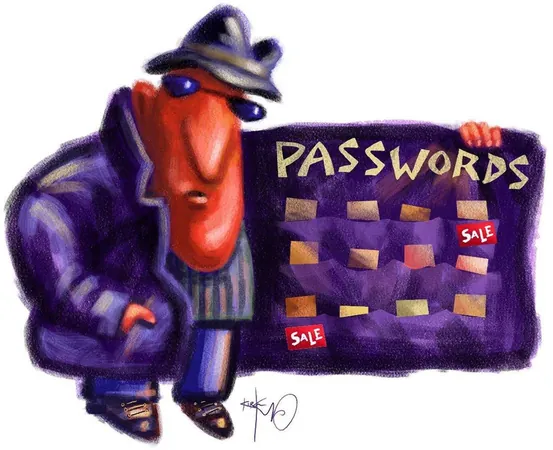
Ditch Your Passwords! 1Password and Google Sound the Alarm on the Future of Security
2024-11-22
Author: Wai
In a recent update, the U.S. Cybersecurity and Infrastructure Security Agency (CISA) has issued a crucial warning regarding the outdated reliance on passwords. This announcement comes amid growing concerns about the effectiveness of traditional authentication methods as cyber threats evolve. Giants like 1Password and Google are leading the charge towards a passwordless future, advocating for a more secure alternative: passkeys.
1Password has long been recognized for its commitment to password management and security. As user awareness grows, the company reports a substantial shift toward passkey adoption, showing that users are eager to embrace this more secure technology. According to Anna Pobletts, the head of passwordless technology at 1Password, data indicates that about 29% of its users now have at least one passkey stored, with monthly passkey authentications surpassing 2.1 million.
The surge in passkey adoption can be attributed in part to significant industry shifts. Major platforms, including Amazon and Walmart, have integrated passkey capabilities into their login processes, with Amazon alone boasting over 175 million passkeys in use. The most remarkable spike in passkey registrations occurred in mid-April 2024, closely following X’s announcement that it would support passkeys for iOS users globally.
Why Passkeys Are the Future
Developed through collaborative efforts by tech leaders like Apple, Google, and Microsoft, passkeys utilize advanced security standards such as FIDO and WebAuthn. They offer a multitude of advantages over traditional passwords. As 1Password's chief product officer, Steve Won, explained, passkeys consist of two unique cryptographic keys: a public key stored on the service’s server and a private key safely kept on the user’s device. This system virtually eliminates the risk of credential theft, as the keys are never shared, and are almost impossible for hackers to guess or intercept.
Top Reasons to Switch to Passkeys:
1. Inherent Complexity: Passkeys are incredibly strong by default, as they cannot be easily guessed or repeated.
2. Phishing Prevention: Since credentials are never shared or transmitted during the authentication process, there’s nothing for attackers to steal.
3. User-Friendly: Passkeys are auto-generated, meaning users won’t have to remember difficult passwords—authentication can even be done using biometrics.
Overcoming User Hesitancy
Despite the clear advantages, many users remain hesitant to abandon passwords entirely. Cultural familiarity with password-based systems presents a significant barrier. According to Pobletts, education is key—by increasing the public's understanding and comfort with passkeys, mass adoption can flourish.
Continuing Risks with Traditional Authentication
The CISA has highlighted the alarming increase in multi-factor authentication (MFA) bypass attacks, stressing that legacy MFA solutions are not equipped to handle current threats. As cyber threats evolve, the necessity for robust security measures becomes increasingly vital.
One notable success story involves the U.S. Department of Agriculture (USDA), which deployed FIDO authentication across its workforce. This transition allowed 40,000 employees to access secure systems without falling prey to traditional credential phishing methods.
1Password is actively collaborating with industry players like Microsoft to enhance passkey support across platforms, signaling a collective push towards phasing out passwords comprehensively.
The Future is Bright—And Passwordless
With the path ahead looking promising, technology leaders are setting ambitious goals. By 2025, we can expect further enhancements in passkey integrations that will make the transition even smoother, accelerating the decline of passwords in favor of a safer, more efficient login experience.
As passwords become relics of a bygone era, embracing passkey technology can be your ticket to enhanced security. The future of online safety is at our fingertips—literally. Join the movement to make passwords obsolete today!


 Brasil (PT)
Brasil (PT)
 Canada (EN)
Canada (EN)
 Chile (ES)
Chile (ES)
 España (ES)
España (ES)
 France (FR)
France (FR)
 Hong Kong (EN)
Hong Kong (EN)
 Italia (IT)
Italia (IT)
 日本 (JA)
日本 (JA)
 Magyarország (HU)
Magyarország (HU)
 Norge (NO)
Norge (NO)
 Polska (PL)
Polska (PL)
 Schweiz (DE)
Schweiz (DE)
 Singapore (EN)
Singapore (EN)
 Sverige (SV)
Sverige (SV)
 Suomi (FI)
Suomi (FI)
 Türkiye (TR)
Türkiye (TR)